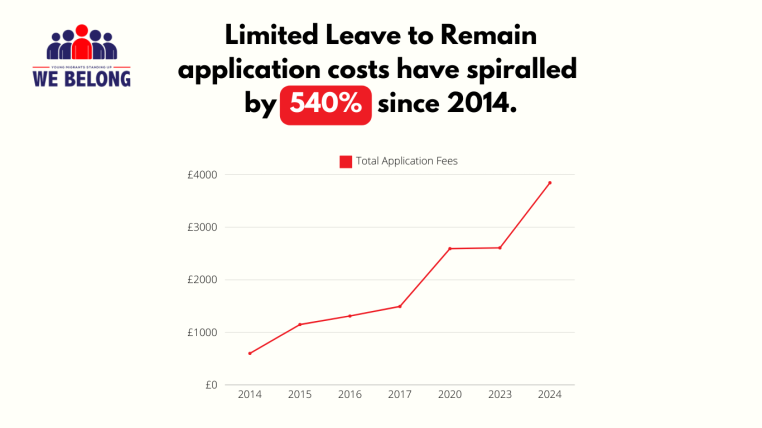Words by
Frances Fraser: Co-Producer at We Belong
Our Co-producer Frances Fraser writes about how we continue the Legacy of Let Us Learn; our campaign to secure access to higher education for all young migrants.

For the first time in over 8 years, tuition fees for undergraduate students will be increased, rising from £9,250 to £9,535 starting in 2025. The government announced this change on November 4, 2024, citing financial shortfalls across universities. However, while this aims to address university funding gaps, it raises serious concerns about the broader implications for students, particularly young migrants. For those navigating financial precarity caused by a labyrinth of immigration regulations, the dream of higher education grows increasingly out of reach.
Extensive Home Office requirements and spiralling application fees already place a significant financial burden on young migrants. The additional cost of higher education pushes the dream of university further out of reach. With fewer financial support options and the looming prospect of debt, higher education becomes an increasingly unattainable goal.
Furthermore, the basic step of accessing a government student loan is highly dependent on one’s citizenship status, course and degree type within the UK. To even apply, a young person must have lived in the UK half their life whilst simultaneously spent 3 years prior carrying out successive Limited Leave to Remain (LLR) re-applications, each with a cost of around £3,845.
Only after 5 years of consecutive LLR application, a reduction from 10 years thanks to We Belong’s extensive campaign work, can a young person apply for Indefinite Leave to Remain (ILR) and one year later, for full British citizenship. Both processes involve exorbitant costs and waiting times, without mentioning the impact it has on young people's senses of isolation and anxiety, as their future feels caught in the hands of the Home Office.

Recent figures from the Home Office show a 16% drop in overseas student visa applications, reflecting how harmful narratives and rising income requirements deter potential students from coming to study in the UK. This reduction in international tuition income has been a contributing factor to the government’s decision to raise fees for home students. Yet, for young migrants, this creates a double burden—facing both the rising cost of tuition and the systemic barriers embedded in the UK’s immigration and education systems.
If a young person does not meet the requirements for student finance, they will be classified as an 'international student.' This means they will not have access to government tuition fee support and may face tuition fees of up to £40,000.
For instance, Mariam, who arrived in the UK at the age of 15 and aspired to study Medicine at university, faced a challenging situation. She was classified as an international applicant, which nearly made it impossible for her to secure her spot at Plymouth University, despite her mother and brother being British citizens and her status as a lawful resident. (We Belong, The Deintegration Generation, 2021).
Faiqa’s story, from We Belong’s 2020 Impact Report, also exemplifies this struggle. Arriving in the UK at age 12, Faiqa faced numerous hurdles when applying for university. Her asylum claim affected her immigration status, leading to the denial of both tuition fee support and student loans. Through We Belong’s assistance, she eventually secured a scholarship and a student loan, but her options remained limited—she couldn’t pursue medicine due to the lack of funding for non-settled applicants.
As is clear, financial precarity is a critical factor in the lives of young migrants, with application costs and tuition fees becoming the greatest hurdle in their prolonged fight for secure settlement in the country they call home. With growing financial pressures from both the education system and Home Office fees, young migrants are being pushed further to the margins, making higher education an increasingly distant dream.
At We Belong, an organisation that evolved from Let Us Learn—a campaign dedicated to securing access to UK universities for all young migrants—we firmly oppose the recent policy change that calls for rising education fees. We are committed to encouraging, empowering, and advocating for young migrants' fair access to education and employment. We support these individuals in standing up against institutional changes like this one, which significantly impacts their access, inclusion, and potential for future opportunities.
We support young migrants throughout their journey toward citizenship and higher education. This includes those who are currently undergoing Home Office application processes, seeking a university place, or already studying as they build their confidence to become leaders and shape their own futures. We are committed to our mission of assisting young migrants across the UK in overcoming intersecting barriers related to immigration and education. We focus on encouraging, campaigning for, and activating systematic reform to ensure access to citizenship, higher education, and high-quality opportunities alongside their British peers.

UCL Policy Lab, Photo by Ray Zhu

The University of Manchester, Photo by Muhammed Zahid Bulut
